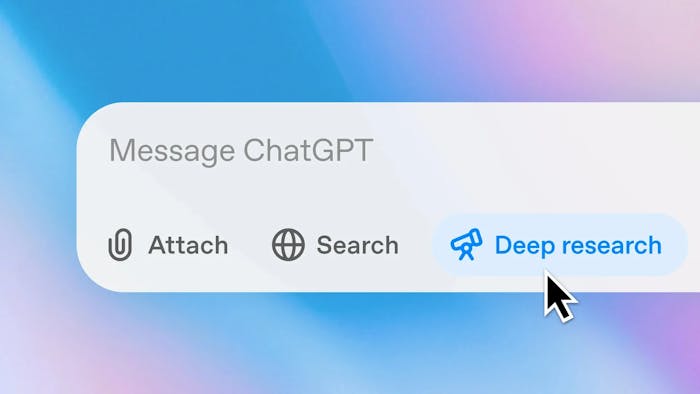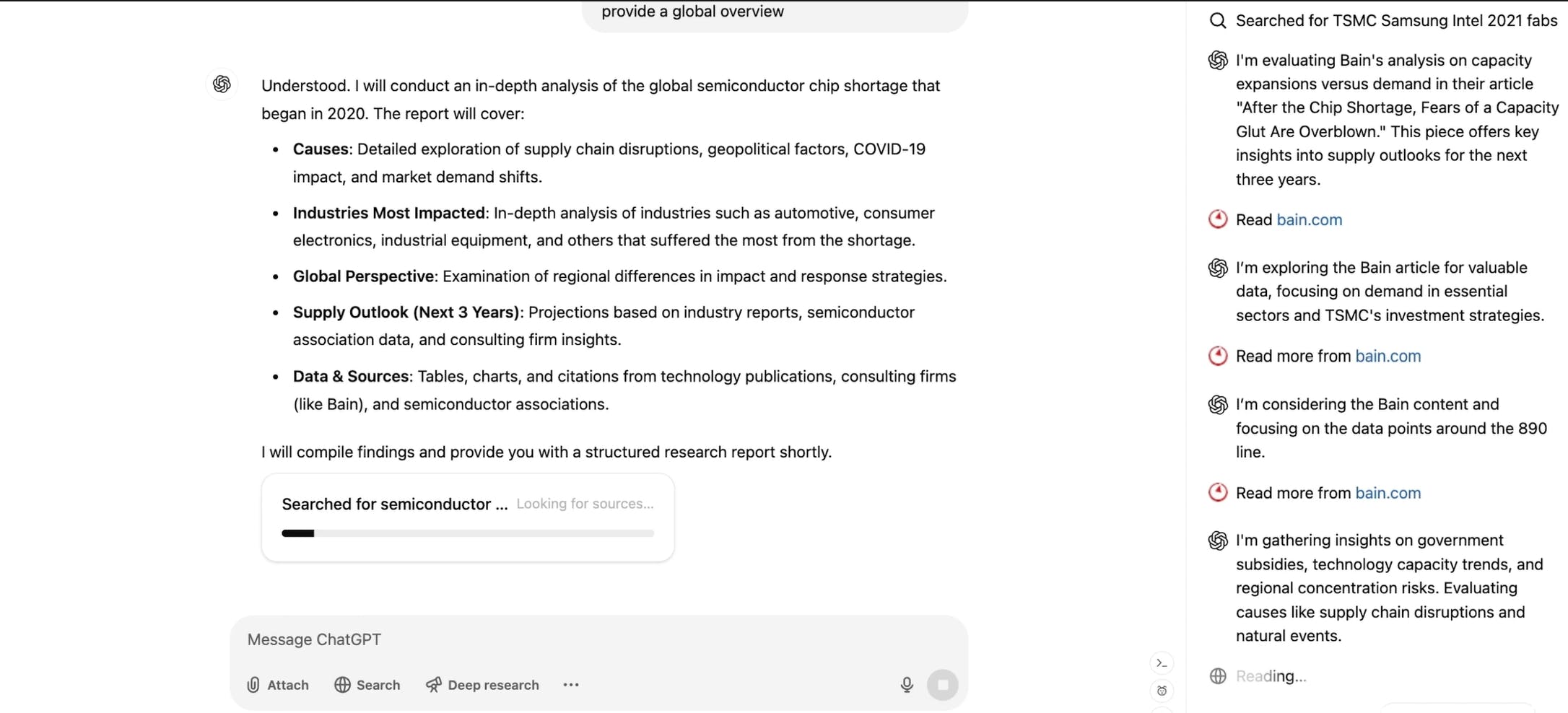What OpenAI's new "Deep Research" agent means for indie
hackers
Deep Research compiles highly technical reports using upgraded web search skills. Here's how it works and how indie hackers can take advantage.

Deep Research compiles highly technical reports using upgraded web search skills.
It's only available via the ChatGPT interface, with no word on an API.
Three areas where Deep Research might prove useful for indie hackers are in idea generation, content creation, and worfklow automation.
Pro users outside of Europe get limited access from today, with Plus and Teams users next in line.
Just three days after launching a new reasoning model, OpenAI has dropped another product: an agent that can autonomously browse the web to compile detailed reports.
Deep Research addresses a longstanding limitation of AI models that struggle to produce comprehensive reports on technical subjects. OpenAI says its new agent can scour the web for niche details, changing tack as it goes to improve its searches in response to the data it finds.
The result, the company claims, are reports that compare to those of professional research analysts. Except they take minutes, not hours.
It's designed for scientific, medical and other technical use cases, but early users have used it to produce everything from dissertation-length reports on Tolstoy's War and Peace to lists of financial irregularities in public company filings.
How does Deep Research work?
AI models typically struggle to write well-researched long-form responses. Think detailed market reports or academic literature reviews. Part of the problem is they usually search the web once, purely based off the query a user provides.
Unlike standard web-connected LLMs, Deep Research uses a "chain of thought" process to produce better reports. It also asks clarifying questions right at the start to clarify exactly what a user wants it to find. Then it searches the web repeatedly as it puts together its response, shaping the structure and content on the basis of the data it finds.
It's essentially a version of the upcoming o3 "reasoning" model equipped with the ability to search the web repeatedly and some python analysis skills.
It takes a while to deliver a report — up to 30 minutes, in fact. But OpenAI says humans would take hours to come up with something similar.
How to use Deep Research
Users with access will see a "Deep research" button beneath ChatGPT's regular prompt input box. Select this box, and the agent will receive their prompt.
Initially, the agent will follow up with clarification questions to improve the prompt and ensure it knows exactly what the user wants it to write.

The agent will then get to work scouring the internet for text, images and PDFs it can read and analyse.
Depending on the query, results can take anything from one to 30 minutes to appear. But interested users can view progress updates by opening a sidebar, as you can see in the image above.
OpenAI claims Deep Research gives state-of-the-art results on several academic-focused benchmarks. But it is still prone to error, so you should double-check any facts it cites before you use its reports in your business.
The companys says DeepSeek less likely to make mistakes than older solutions. But it still hallucinates, and it struggles to distinguish fact from rumor. It also can't really convey uncertainty, so it will likely sound confident in its findings, even when it shouldn't.
Its reports may give you a useful window into new markets, but they can't be treated as fact. This may affect its utility as the engine behind a report-writing business, should an API eventually become available.
Three ways indie hackers can take advantage of Deep Research
For tech startups in general, Deep Research might prove a useful tool for detailed market research and business planning.
Indie hackers tend to move quickly and work with smaller budgets, so three areas of concern that are common to the community are coming up with ideas, creating content, and automating workflows.
Here are ways Deep Research can help in these areas:
1. Generating Business Ideas
Deep Research can swiftly scan websites, forums, and databases to uncover niche markets and emerging trends.
Indie hackers can use it to spot untapped opportunities and quickly validate ideas by gathering competitor data, user opinions, and market stats —providing a fast first look at a startup’s potential.
2. Optimizing Content Creation
For creators running newsletters, blogs, or YouTube channels, Deep Research serves up rich data, fresh angles, and little-known statistics.
This will let indie hackers craft engaging, evidence-backed content that stands out and builds trust with their audience.
3. Automating Workflows
By acting as an on-demand research assistant, Deep Research automates tasks like competitor analysis and trend monitoring, etc.
I see indie hackers integrating it with tools like Zapier or Notion to free up time.
Who can access Deep Research today?
Deep Research will roll out to Pro subscribers today, with Plus and Teams users expected to get access in about a month's time.
That is, unless they live in Europe. Like OpenAI's first agent, Operator, it's not clear when Deep Research will be available in the European Union, the U.K. and the European Economic Area.
This territory-wide blocker is likely because of restrictions in the EU's recent AI Act. OpenAI says it hopes to eventually bring these products to the region, but doesn't give a timeline.
is the new feature of chatgpt?
pro users outside of europe are lucky to have access. i’m excited to see how this tool evolves, especially for those in scientific and medical fields. it could really push boundaries in terms of speed and accuracy… as long as they fix the fact-checking part.
Yes Giving a tough competition to deepseek now , I mean they have to survival of the fittest is so true in AI game
great article. One correction: "The companys says DeepSeek less likely to make mistakes than older solutions." Should be "The companys says Deep Research less likely to make mistakes than older solutions."
Excited to see how creators and entrepreneurs leverage this for smarter decision-making. Hopefully, access expands soon to more regions!
Was this available only in Paid version?
yes, for now. It is currently only available to Pro subscribers ($200 p/m), but will roll out to Plus ($20 p/m) users in about a month
Deep Research looks like a significant step toward AI-powered technical analysis, but the lack of an API (for now) limits its potential for automation and integration into real-world workflows. The ability to iteratively refine searches and compile detailed reports is impressive—especially for market research, legal analysis, and technical fields—but the usual AI pitfalls remain. It still hallucinates, struggles with distinguishing fact from rumor, and doesn’t convey uncertainty well.
Can you share what tests did you make to confirm the shared information?